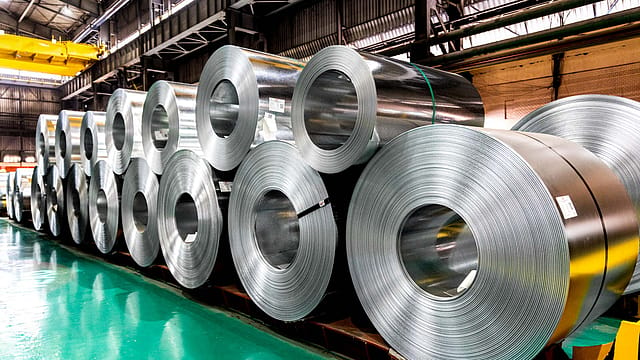Tata Steel, JSW Steel, Hindalco, Jindal Steel near 52-week highs: What’s driving steel stocks?
ADVERTISEMENT

Shares of steel companies such as Tata Steel , JSW Steel , Hindalco Industries , Jindal Steel , and others are trading close to their 52-week highs, supported by a sustained rally in recent weeks. Market analysts attribute the uptrend in metal stocks to strong demand prospects, firm global commodity prices, and robust domestic infrastructure spending. In addition, supportive government policies and optimism around China’s move to curb steel production are further boosting sentiment in the sector.
The Nifty Metal index has gained nearly 7% month-to-date, while the benchmark Nifty50 has advanced 1.8% so far in September. Over the past six months, the index has surged more than 10%, despite the aggressive tariff policy by the U.S. and broader global uncertainty.
Driven by a sustained rally, Tata Steel, the country’s most valued steel stock, touched its 52-week high of ₹172.45 on September 8, 2025, rebounding over 40% from its 52-week low of ₹122.60 on January 13, 2025.
JSW Steel shares also hit a fresh 52-week high of ₹1,112 in the previous session, rising 26% in the past eight months from the 52-week low of ₹879.60, also recorded on January 13, 2025.
Similarly, Hindalco Industries shares have climbed 37% from their 52-week low of ₹546.25 on April 7, 2025. The metal heavyweight is currently trading at ₹746.95, inching closer to its 52-week high of ₹772, touched on October 3, 2024.
Jindal Steel shares are currently trading at ₹1,030, hovering near its 52-week high of ₹1,073.65 touched on September 17, 2024. The counter slipped to its 52-week low of ₹723.95 on January 31, 2025.
What driving steel stocks?
Global brokerage firm Morgan Stanley, in its latest report, said it expects select steel stocks to outperform the broader Indian materials sector over the next few months. The brokerage house has upgraded JSW Steel to an 'Overweight' rating and raised the target price to ₹1,300. It has also revised Tata Steel to an 'Overweight' rating while raising its price target to ₹200.
“We believe India's steel industry is around the start of a spreads expansion cycle, with domestic steel prices expected to expand as demand improves incrementally, China anti-involution playing out, and global macro factors turning favorable,” Morgan Stanley said in a latest report.
“Additionally, there is optionality in play if safeguard duty gets extension. Against this backdrop, JSW Steel is well positioned, given its high share of domestic business skewed in favor of flat steel, with margin expansion in play from HRC price expansion and strong volume growth,” it added.
According to market analysts, China’s planned production cuts are aimed at tackling global overcapacity, which has kept steel prices under pressure for months. The move is expected to curb the inflow of low-cost steel into India, providing a boost to domestic metal producers.
A recent report by Emkay Global highlighted that while policies in both India and China are addressing supply-side constraints, domestic steel demand remains muted. However, market participants are anticipating a post-monsoon revival starting September, led by increased government capex and GST recalibration.
“Interestingly, we are of the firm view that price volatility could reduce with the safeguard duty’s extension for three years, with the price floor being supported by policy clarity, while any meaningful upside would be capped by import price parity,” Emkay said in its August 27, 2025 report.
Last month, the Directorate General of Trade Remedies (DGTR) issued its final recommendation to impose a safeguard duty on imports of certain flat steel products for three years, with rates set at 12% in the first year, 11.5% in the second, and 11% in the third. The measure is intended to protect domestic manufacturers and partially decouple local steel prices from import parity, which is typically influenced by China’s steel market.
At present, domestic steel is trading at a 9% discount to import prices, meaning the safeguard duty is likely to restrict imports rather than artificially inflate domestic prices. According to Emkay, this decoupling will provide Indian producers with greater flexibility to price products based on domestic supply-demand dynamics, thereby reducing their dependence on China’s volatile macroeconomic environment.